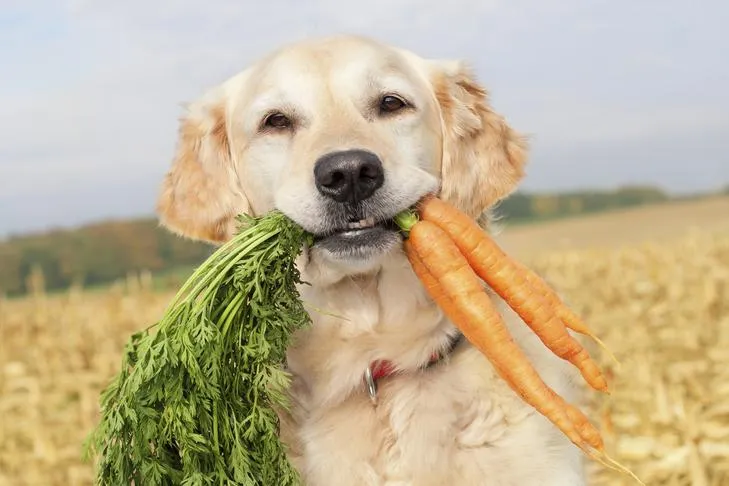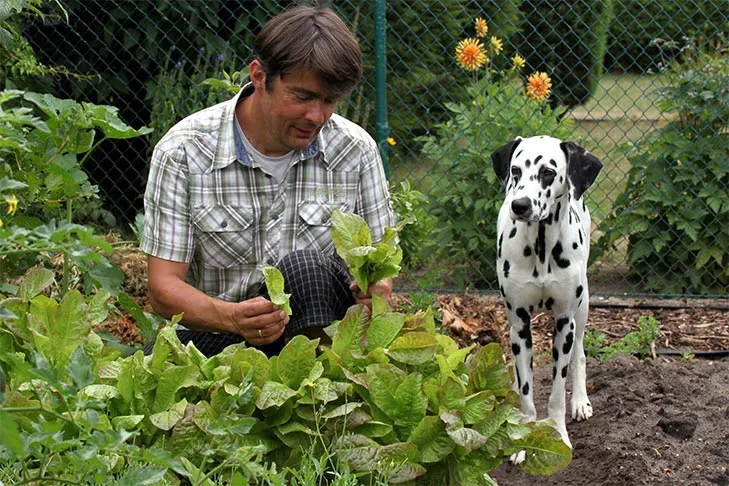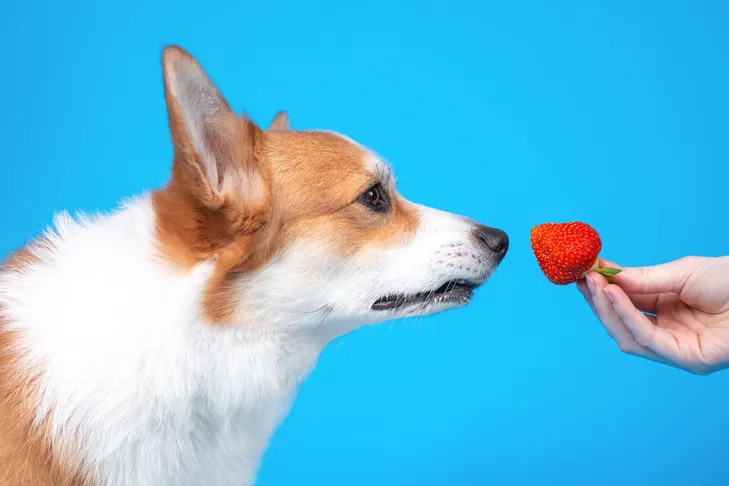It’s a common and heartwarming gesture to share our favorite snacks with our beloved canine companions. After all, if a treat is safe for us, it must be equally safe for our furry friends, right? Not necessarily. Dogs digest foods differently than humans, and eating the wrong human food can lead to short-term digestive upset, long-term health problems, and, in severe cases, even death. Understanding foods dogs can’t eat is crucial for any responsible pet owner. While dogs, as omnivores, don’t strictly require fruits or vegetables in their diet, providing dog-safe options as occasional treats can offer beneficial vitamins, minerals, and antioxidants.
This comprehensive guide from Dog Care Story will help you navigate the complex world of human foods for dogs, focusing specifically on which vegetables and fruits are dangerous and which can be safely enjoyed in moderation.
The Dangers Lurking in Your Kitchen and Garden: Vegetables Dogs Should Never Eat
When it comes to sharing your harvest, some vegetables that are perfectly healthy for humans can be toxic or harmful to dogs. Keeping these out of reach is paramount for their safety.
Onions, Leeks, and Chives (Allium Family)
Among the most dangerous vegetables for dogs are those in the Allium family, including onions, leeks, and chives. These common culinary ingredients contain compounds that are highly toxic to most pets, especially cats, but dogs are also very susceptible. Ingestion can lead to the rupture of your dog’s red blood cells, a condition known as hemolytic anemia. Symptoms of onion poisoning can include vomiting, diarrhea, stomach pain, nausea, lethargy, and a reduced appetite. Japanese breeds like Akitas and Shiba Inus are particularly sensitive to these toxins. It’s critical to ensure that any food containing these ingredients is kept securely away from your dog. For a broader perspective on foods to avoid, you might be interested in our guide on human meat dogs shouldn’t eat.
Wild Mushrooms
While certain mushrooms purchased from supermarkets for human consumption are generally safe for dogs in very small, cooked amounts, wild mushrooms are an entirely different story. Many of the 50,000 mushroom species worldwide are toxic, and the poisonous ones can cause severe illness or even be fatal to your dog. Symptoms can range from gastrointestinal upset to liver failure, kidney damage, and neurological issues, depending on the type of mushroom ingested. Unless you are an expert in mushroom identification, it is always best to assume that any wild mushroom is poisonous and keep your dog away from them. If your dog consumes a wild mushroom, seek immediate veterinary attention.
Asparagus: More Trouble Than It’s Worth
Asparagus isn’t classified as toxic to dogs, but it offers virtually no nutritional benefit, making it a poor choice for a dog treat. Its tough, fibrous stalks are difficult for dogs to chew and digest when raw, posing a potential choking hazard or causing intestinal upset. By the time asparagus is cooked down enough to be soft and digestible for dogs, most of its minimal nutritional value is lost. Given the abundance of other healthy and safer vegetable options available, it’s generally best to skip asparagus and choose a more beneficial treat for your dog.
Fruits to Keep Away From Your Canine Companion
Just as with vegetables, certain fruits that are healthy for humans can be dangerous for dogs. Awareness of these is essential for preventing accidental poisoning.
Grapes and Raisins: A Severe Threat
Grapes and raisins are exceptionally toxic to dogs, regardless of breed, age, or sex. Even a small amount can lead to acute kidney failure. The exact toxic substance is still unknown, but the severity of the reaction makes them extremely dangerous. If you suspect your dog has eaten grapes or raisins, contact your veterinarian immediately; this is a veterinary emergency. Always be vigilant about keeping these fruits out of your dog’s reach, especially if children are in the house who might leave them unattended, and ensure they are disposed of in a dog-proof trash bin, not a compost pile your pet can access. To help prevent such incidents, familiarize yourself with other toxic foods for dogs that are commonly found in human diets.
Cherries: Cyanide in the Pit
The fleshy fruit of cherries around the seed is generally safe for dogs, but the pit itself, along with the stems and leaves of the cherry plant, contains cyanide. Cyanide disrupts the cellular oxygen transport system, which can be life-threatening if enough is ingested. Symptoms of cyanide poisoning include dilated pupils, difficulty breathing, and red gums. Always remove the pit before offering cherry flesh to your dog, and ensure discarded pits are securely placed in a dog-proof receptacle. If you have a cherry tree, prevent your dog from accessing fallen fruit. For dogs craving the taste, cherry-flavored dog treats are a safer alternative.
Avocado: Persin and High Fat Content
While avocado has gained popularity as a healthy human snack, it should not be given to dogs. The pit, skin, and leaves of avocados contain a fungicidal toxin called persin, which can cause vomiting and diarrhea in dogs. Although the fleshy inside of the fruit has less persin, it can still be enough to cause gastrointestinal upset for sensitive dogs. Furthermore, avocado flesh is high in fat, which can lead to digestive issues or, if consumed in large quantities, contribute to conditions like pancreatitis, an inflammation of the pancreas. If you wish for your dog to benefit from avocado’s healthy fats, look for dog treats specifically formulated with avocado as an ingredient.
Tomatoes (Green Parts): The Solanine Threat
The ripened red flesh of a tomato is generally considered safe for dogs to eat in small, occasional amounts. However, the green parts of the tomato plant—including the leaves, stems, and unripened green tomatoes—contain a toxic substance called solanine. While a dog would likely need to consume a significant amount of the plant to become seriously ill, it’s safer to avoid giving your dog any part of the tomato plant altogether. If you have a vegetable garden, take steps to prevent your dog from accessing your tomato plants to avoid accidental ingestion of the green parts.
Safe and Healthy Vegetable Treats for Your Dog (in Moderation)
Understanding which vegetables are safe for your dog is crucial for providing wholesome treats. While some vegetables offer excellent nutritional benefits, others are best avoided. Here are several vegetables you can confidently share with your dog as an occasional, healthy snack. For more ideas on what beneficial human food dogs can eat, explore our comprehensive guide.
Carrots
Carrots are an excellent low-calorie snack packed with fiber and beta-carotene, which is converted into vitamin A in your dog’s body. The satisfying crunch of this orange root vegetable also provides a natural way to help clean your dog’s teeth. Carrots are a common ingredient in many commercial dog foods and are widely available as standalone dog treats. They can be given raw, cooked, or frozen in bite-sized pieces.
 Golden Retriever holding carrots.
Golden Retriever holding carrots.
Green Beans
Chopped, steamed, raw, or canned (plain, with no added salt)—all types of green beans are safe and healthy for dogs. They are rich in essential vitamins and minerals, full of fiber, and low in calories, making them an ideal treat for dogs, especially those managing their weight. For canned varieties, always opt for no-salt-added options to avoid excess sodium in your dog’s diet. Frozen green beans can also serve as a refreshing and engaging snack, particularly on warm days.
Peas
Green peas, snow peas, sugar snap peas, and garden or English peas are all acceptable for dogs to enjoy occasionally. Peas are a good source of several vitamins, minerals, protein, and fiber. You can feed your dog fresh or frozen peas; however, avoid canned peas that often contain high levels of added sodium. Offering them plain and uncooked or lightly steamed is the best approach.
Brussels Sprouts
These nutrient-dense miniature cabbages are loaded with antioxidants that are beneficial for both humans and canines. While healthy, Brussels sprouts should be given in moderation, as overfeeding can lead to excessive gas and discomfort for your dog. If your dog enjoys them, consider incorporating them into their diet in small amounts or exploring dehydrated dog foods that include leafy greens.
Broccoli
Broccoli can be safe for dogs in small amounts and is best served as an occasional treat. It’s high in fiber and vitamin C and low in fat. However, the florets contain isothiocyanates, which can cause mild to potentially severe gastric irritation in some dogs if consumed in large quantities. The tough stalks of broccoli have also been known to cause esophageal obstruction in dogs. To mitigate these risks, it’s better to offer your dog cooked broccoli in small, manageable pieces.
Celery
Beyond being a crisp, hydrating snack, celery provides vitamins A, B, and C, along with nutrients that can promote heart health and potentially help fight cancer. An added bonus is that celery is known to help freshen doggy breath. Like other fibrous vegetables, offer celery in small, bite-sized pieces to prevent choking. Celery dog chews are also available if your dog enjoys the taste and texture.
Spinach: Proceed with Caution
Dogs can eat spinach, but it’s not the top recommendation for a regular vegetable treat. Spinach contains oxalic acid, which can interfere with the body’s ability to absorb calcium and, in very large amounts, could potentially lead to kidney damage. While a dog would likely need to consume an extremely large quantity of spinach for this to become a problem, many other safer and more beneficial vegetables are available. If you choose to give your dog spinach, do so sparingly or opt for spinach-infused dog treats designed for safe consumption.
 Dalmatian watching a man gardening and picking leaves.
Dalmatian watching a man gardening and picking leaves.
Dog-Friendly Fruits: A Sweet Treat Guide (in Moderation)
Many fruits can be a delicious and healthy treat for dogs when given in moderation, offering a natural source of vitamins, minerals, and antioxidants.
Apples
Apples are an excellent source of vitamins A and C, and fiber for your dog. They are low in protein and fat, making them a suitable snack, especially for senior dogs. Always remove the seeds and core first, as apple seeds contain small amounts of cyanide and the core can be a choking hazard. Frozen apple slices make for a refreshing warm-weather treat.
 Siberian Husky puppy being held up in front of an apple tree.
Siberian Husky puppy being held up in front of an apple tree.
Bananas
In moderation, bananas are a fantastic low-calorie treat. They are rich in potassium, vitamins, biotin, fiber, and copper, and are low in cholesterol and sodium. However, due to their high sugar content, bananas should only be given as an occasional treat and not as a significant part of your dog’s diet.
Blueberries
Often called a superfood, blueberries are packed with antioxidants that help prevent cell damage in both humans and canines. They also provide fiber and phytochemicals. Their small size makes them an excellent training treat or a fun snack for dogs to catch. Many blueberry-infused dog treats are also available.
Cantaloupe
Cantaloupe is a nutrient-dense fruit that is low in calories and an excellent source of water and fiber. Its high sugar content means it should be shared sparingly, especially with dogs who are overweight or have diabetes. Freezing small cubes of cantaloupe can offer a refreshing and enriching summer snack.
Cranberries
Both fresh and dried cranberries are safe for dogs in small quantities. While some dogs might not enjoy their tart taste, cranberries offer beneficial antioxidants. It’s crucial to offer unsweetened fresh or frozen cranberries, as many dried cranberries marketed for human consumption are heavily sweetened, adding unnecessary sugar to your dog’s diet.
Cucumbers
Cucumbers are particularly beneficial for overweight dogs due to their very low carbohydrate and fat content, and their high water content promotes hydration and satiety. They are loaded with vitamins K, C, and B1, as well as potassium, copper, magnesium, and biotin. Cool cucumber slices are a refreshing treat, especially during hot weather.
 Dog with cucumber slices on its face.
Dog with cucumber slices on its face.
Mango
This sweet, tropical fruit is a good source of vitamins A, B6, C, and E, along with potassium, beta-carotene, and alpha-carotene. As with peaches and other stone fruits, always remove the hard pit first, as it contains small amounts of cyanide and can be a significant choking hazard. Due to mango’s high sugar content, offer it as an occasional treat.
Oranges
Veterinarians consider oranges safe for dogs, though their strong citrus scent and taste often deter canines. The juicy flesh of an orange, minus any seeds, is an excellent source of vitamin C, potassium, and fiber. The orange peel should be removed entirely, as it can be rough on a dog’s digestive system, and its oils may cause irritation.
Peaches
Small amounts of fresh or frozen, cut-up peaches are a great source of fiber and vitamin A. However, like cherries, peach pits contain cyanide. Ensure the flesh is completely cut away from the pit, and dispose of pits securely. Avoid canned peaches, which typically contain high amounts of sugary syrups that are unhealthy for dogs.
Pears
Pears are a beneficial snack, rich in copper, vitamins C and K, and fiber. When sharing pears, make sure to cut the flesh into bite-sized chunks and remove the pit and seeds, as they contain traces of cyanide. Again, avoid canned or jarred pears with added sugary syrups.
Pineapple
A few chunks of fresh pineapple can be a sweet and hydrating treat for dogs, provided the prickly outer peel and tough crown are removed. This tropical fruit is full of vitamins, minerals, and fiber, and it contains bromelain, an enzyme that aids in protein absorption. Always opt for fresh, unsweetened pineapple to avoid added sugars found in canned varieties.
Pumpkin (Pure)
Pure pumpkin is a highly beneficial food for dogs. It’s rich in antioxidants, and famously effective in helping to relieve both diarrhea and constipation in dogs. When buying canned pumpkin, always choose 100% pumpkin puree, not pumpkin pie filling which contains added sugars and spices. You can also roast pumpkin at home and feed the peeled flesh to your dog.
Raspberries
Raspberries are safe for dogs in moderation, offering antioxidants, fiber, manganese, and vitamin C, while being low in sugar and calories. They are particularly good for senior dogs due to their anti-inflammatory properties, which can support aging joints. Raspberries contain trace amounts of naturally occurring xylitol, so limit your dog to no more than 8 ounces of fresh or frozen raspberries per day.
Strawberries
Strawberries are packed with fiber and vitamin C, and they contain an enzyme that can help whiten your dog’s teeth. Like all fruits, they contain natural sugar, so offer them in moderation. Frozen strawberries make for an engaging enrichment treat.
 Pembroke Welsh Corgi sniffing at a strawberry.
Pembroke Welsh Corgi sniffing at a strawberry.
Watermelon
Dogs can enjoy watermelon, but it’s crucial to remove all seeds and the rind first, as these can cause intestinal blockage. The flesh of the watermelon is safe and is an excellent source of vitamins A, B-6, and C, as well as potassium. Composed of 92% water, it’s a fantastic way to help keep your dog hydrated, especially on hot summer days.
Understanding Why Some Foods Are Harmful
The difference in canine and human digestive systems is key to understanding why certain foods are harmful to dogs. Their bodies process substances differently, making some compounds toxic that would be harmless to us. Specific toxins like persin in avocado, cyanide in cherry pits, solanine in green tomatoes, and compounds in the Allium family (onions, garlic) can have serious, even fatal, effects. Furthermore, foods high in sugar or fat can lead to gastrointestinal upset, obesity, or more severe conditions like pancreatitis. Choking hazards from pits, large seeds, or fibrous stalks also pose a significant risk. Even for safe foods, moderation is vital, as excessive amounts can disrupt a dog’s digestive balance or lead to overconsumption of sugars. Moreover, understanding specific dietary needs, such as raw meat for huskies, highlights how different breeds might have unique nutritional considerations.
When to Seek Veterinary Advice
It is essential to recognize the signs that your dog may have ingested a toxic food and know when to seek professional help. Symptoms such as persistent vomiting, diarrhea, lethargy, loss of appetite, difficulty breathing, dilated pupils, red gums, or severe stomach pain warrant immediate veterinary attention. If you suspect your dog has consumed highly toxic foods like grapes, raisins, onions, or cherry pits, do not wait for symptoms to appear; contact your veterinarian or an emergency animal hospital immediately. Prevention is always the best approach, so educating all family members about safe and unsafe foods and securing all potential hazards are critical steps in protecting your dog’s health. For additional guidance, consider exploring what to give a dog that won’t eat if your dog is experiencing appetite issues.
Conclusion
Navigating the world of human foods for your dog requires careful consideration and knowledge. While many fruits and vegetables offer healthy and delicious treats in moderation, it is paramount to be aware of those that pose significant health risks. From the dangerous toxins found in onions and grapes to the choking hazards of fruit pits, understanding these distinctions is crucial for your pet’s well-being. Always prioritize your dog’s health, consult your veterinarian for specific dietary advice tailored to your pet, and ensure that any shared human food is safe, properly prepared, and given only as an occasional treat.
